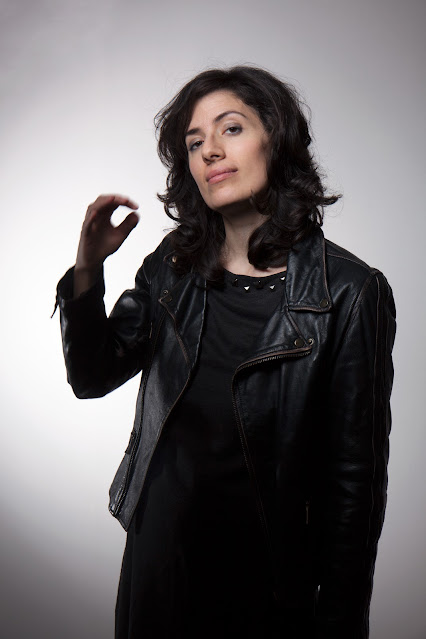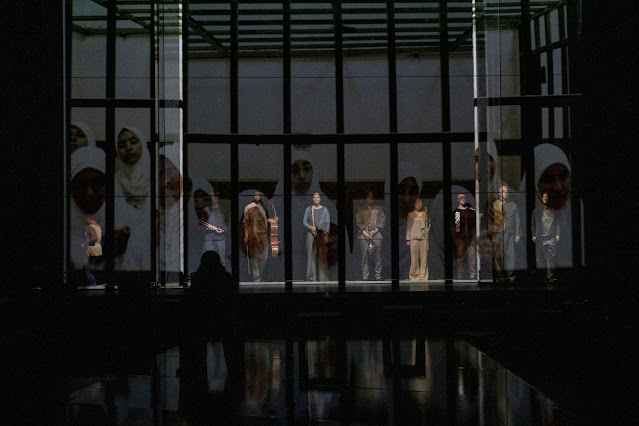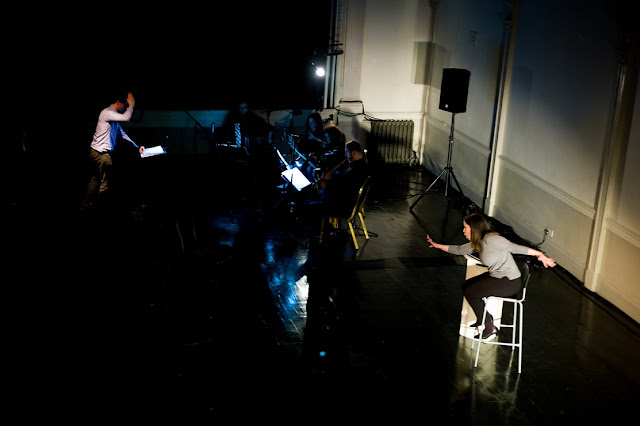 |
| Bushra El-Turk: Woman at Point Zero (Photo Nika Prokopenka Transparant-AllArias) |
Bushra El-Turk is a composer who brings immense cultural richness to her works. Born in the UK to Lebanese parents, her musical practice can involve other musical cultures and traditions. Her opera Woman at Point Zero is being performed at the Royal Opera House's Linbury Theatre (28 to 30 June 2023) as part of Shubbak Festival and Aldeburgh Festival 2023. It is a multi-media piece, created by Bushra, with writer Stacy Hardy, director Laila Soliman and film designer Bissane Al Charif, with an instrumental featuring both Western classical instruments and traditional instruments from other cultures.
 |
| Bushra El-Turk (Photo Ben McDonnell) |
Woman at Point Zero is a co-production between LOD muziektheater, All Aria's festival (deSingel Antwerp, Opera Ballet Vlaanderen, Concertgebouw Brugge & Transparant), Royal Opera House, London, Shubbak, Festival d'Aix-en-Provence, Britten Pears Arts and Grand Théâtre de Luxembourg, supported by ENOA Creative Europe programme of the European Union, Fedora and the Arab Fund for Arts and Culture (AFAC). It premiered at Aix en Provence Festival last year and toured to Antwerp, Ghent, and Brugge, and the production will be presented at the Grand Théâtre de la Ville de Luxembourg (7 June 2023).
The opera is based on Nawal El Saadawi's 1975 novel which Bushra describes as just landing in her lap whilst she was writing her first opera, Silk Moth, in 2015. It dawned on her that El Saadawi's novel needed to be staged, and its story chimed in with Bushra's interest in stories about imprisonment and what it means. Woman at Point Zero features two women, Fatma, an activist imprisoned for manslaughter and Sama, an ambitious documentary filmmaker. Its dialogue form is very interior, just two women whose discussion constantly questions things, freedom today and power dynamics.
The director of Woman at Point Zero, Laila Soliman, who is Egyptian, was already looking into women prisoners and inserting documentary work into her theatre works. With Woman at Point Zero, they decided to take the work into the present day by introducing voices of women imprisoned for killing their husbands, voices of today from the real-life prison where Fatma is imprisoned.
Woman at Point Zero uses an instrumental ensemble of accordion (played by a Serbian musician), sho (a Japanese flute), fujara (a large Slovak wind instrument), duduk (a double-reed instrument from the Caucasus and Middle East, played by an Armenian musician), recorders, taegum (a Korean bamboo flute), kamancha (an Iranian bowed string instrument), qeychak (a bowed lute used in Iran, Afghanistan, Pakistan and Tajikistan), and cello.
None of the instruments is strictly Middle-Eastern, and the score encompasses a spectrum from fully notated to improvised, with some sections in open score. This combination of instruments from different traditions and the relative freedom of the instrumental writing brings an international perspective to the score. Fundamentally, Bushra's idea is to give voice to musicians who are rebels within their own traditions, each musician is well versed in their own traditions and Western classical, and she points out that each musical tradition has its own high art and folk elements. Each player brings their own sense of improvisation, use of traditional modalities and melodic structures, but within Bushra's structure. She describes the result as a harmonic playground, each player ends up finding themselves, taking elements from Bushra's language and exploring them using their tradition's modes and such. Their musical language speaks to her own, and they find a meeting point.
 |
| Bushra El-Turk: Woman at Point Zero (Photo Nika Prokopenka Transparant-AllArias) |
Most of the performers are composers as well, so each had their own solution to the challenge. Choosing the right collaborators means that half the work is already done. The singers are also both trained in Arabic and Western classical traditions. She has been questioning performance in this way in her practice for the last 20 years, it began with her music academy encompassing musicians of different traditions, and then she brought it into her commissions. But she did not form and articulate a system until the end of the R&D period on Woman at Point Zero. There are questions too about ideology, whether the music is about the soundscape created or the fusion of different ideologies if, for instance, she uses the rhythmic structures of one tradition with the improvisation structure of another.
The diverse mix of instruments in Woman at Point Zero brought some intriguing cross-over points, such as the cellist and kamancha player performing Bach together! The musicians are on stage, not in the pit, so have to be open to the physicality of their performance. Bushra describes them as being like a Greek chorus. The conductor, Kanako Abe, has acted before and is also a composer. She describes all the musicians as brilliant collaborators who were all keen to try things out for her. The opera's repetiteur comes from North Africa and is also a composer with knowledge of the Arabic modes, maqam.
Bushra's background is Lebanese, her parents fled to the UK in the early 1980s. She has always questioned where home is; London is technically her home, but she can sometimes feel sidelined. She does not think of her music as particularly Lebanese, but others comment that the contours of her melodic lines feel Lebanese. She grew up in a diverse musical household, her parents listened to both Western music and Middle-Eastern, listening nostalgically to Lebanese and Egyptian singers and ensembles as well as Western classical and Nat King Cole.
Her mother is musical and at Primary School, Bushra was offered free instrumental lessons, she chose the violin at first, before moving to cello and then adding piano, and it was cello and piano that stuck. She describes herself as having very instinctive feelings towards music when she was young. By the time she was 10, she was improvising a lot, not playing what the teachers asked her to. Then when she was seventeen, she heard a bird twittering a repeated rhythm and an orchestral piece 'flew out of her'. She felt an ecstatic euphoria, and this developed into a very creative year. She was lucky that her orchestral piece was performed at the Centre for Young Musicians (which she attended from the age of 10 to the age of 18). She also played in the London Schools Symphony Orchestra. It was natural to apply to the Guildhall School, and during her degree, Bushra also studied Egyptian art music privately. Her composition teacher urged her to 'follow her roots', but for her, it was a question of what did that mean, culture is complex.
 |
| Bushra El-Turk: Silk Moth |
Both Woman at Point Zero and her previous opera, Silk Moth, are about bringing women's stories onto the stage, and this interest in bringing out women's stories is something that occurs elsewhere in her music. She sees it as being an activist in her art. But there are other elements too, on 17 May, she had a premiere of a work for kamancha and string quartet at the Norwich and Norfolk Festival, performed by Iranian virtuoso Faraz Eshghi Sahraei and the Solem Quartet. This work was inspired by the uprisings in Iran. Bushra enjoys using found material and recontextualising it, and here she uses material from an early 20th-century Iranian woman singer who controversially sang without a hijab. This is still relevant today, so the piece looks at both the past and the present.
But other elements feed into her music too, such as climate change in a new work for a Turkish contemporary music ensemble, and personal experience, such as the death of a close relative. This led her to explore different dialogues with the dead, comparing the Christian tradition with other principles that can be more comforting.
Looking ahead, she has another string quartet coming up, and a large work exploring constellations of grief. This latter work is a collaboration between LOD muziektheater in Ghent (where she is going to be composer in residence), Manchester Camerata and Sheffield University. The work will be semi-staged in some way, with elements of music theatre and ritual, but also the involvement of community voices.
Never miss out on future posts by following us
The blog is free, but I'd be delighted if you were to show your appreciation by buying me a coffee.
Elsewhere on this blog
- Regents Opera's new production of Wagner's Die Walküre: a photo essay
- Ein Sommernachtstraum in Essen: Jérémie Rhorer and Le Cercle de l'Harmonie - concert review
- Songs of heartbreak and loss: Lovesick, American counter-tenor Randall Scotting explores 17th-century song from Dowland to Purcell, Étienne Moulinié to Antonio Cesti - record review
- From Psychic Shellfish to a leading role in Wagner's Ring Cycle: Ingeborg Børch's Regents Opera journey - feature
- Grażyna Bacewicz's piano concertos and more: an exciting disc from Peter Jablonski & the Finnish Radio Symphony Orchestra - record view
- A lovely immediacy to the performances: in Monologues, Anna Bonitatibus explores a century of dramatic scenes for solo voice - record review
- Steeping listeners in Indian classical music without them knowing it: sitar player Jasdeep Singh Degun on his new disc, Anomaly, working on Opera North's Orpheus and more - feature
- Then I play'd upon the Harpsichord: Ensemble Hesperi's engaging look at the musical life of Queen Charlotte - video review
- A love of telling stories: Norwegian composer Bjørn Morten Christophersen on setting Charles Darwin's 'On the Origin of Species' to music - interview
- Finding his way: Opera Rara's revival of Donizetti's relatively early L'esule di Roma showed a composer finding his own voice - opera review
- Giovanni Legrenzi: Rinaldo Alessandrini and Concerto Italiano explore motets by one of Venice's most prominent composers - record review
- Home











No comments:
Post a Comment